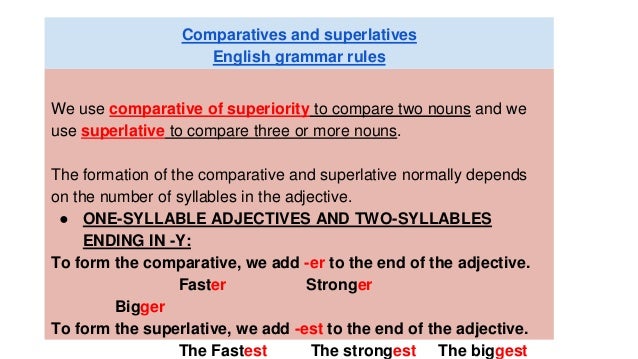Comparative adjectives. We use comparative adjectives to show change or make comparisons: This car is certainly better, but it's much more expensive. I'm feeling happier now. We need a bigger garden. We use than when we want to compare one thing with another: She is two years older than me. New York is much bigger than Boston. Grammar Rule Examples. The cat is faster than the mouse, but the cheetah is the fastest. The dolphin is more intelligent than the dog, but the chimpanzee is the most intelligent.
We often describe something by comparing it to something else. And, when two items are compared, we enter into the land of comparative adjectives. For example, we might say, “This fireplace is bigger than the last one.” When a word ends in -er, it’s a good indication you ’re looking at a comparative adjective.
Other giveaways are the words “more” or “less.” For example, “It’s more expensive to drive a German car than an American car.” Not too difficult, right? Let’s explore several examples of comparative adjectives.
Comparative Adjectives That Add -er
When you have single-syllable adjectives (such as tall), you typically add -er to form the comparative adjective (tall becomes taller). This isn’t universally true, as some multi-syllable words also receive an -er ending, but it’s a good rule of thumb to follow.
In the list below, we’ll start with the root word and then look at its comparative form.
- Bold - Bolder
- Bright - Brighter
- Calm - Calmer
- Dull - Duller
- Fast - Faster
- Gross - Grosser
- High - Higher
- Large - Larger
- Light - Lighter
- Mean - Meaner
- Neat - Neater
- Odd - Odder
- Plain - Plainer
- Quick - Quicker
- Rich - Richer
- Soft - Softer
- Weak - Weaker
- Young - Younger
Sometimes, you have to double the last letter before adding the -er ending. Generally, the rule is that you double the last letter of a single-syllable adjective ending with consonant + vowel + consonant.
Here are a few examples:
- Big - Bigger
- Dim - Dimmer
- Fat - Fatter
- Fit - Fitter
- Flat - Flatter
- Mad - Madder
- Sad - Sadder
- Tan - Tanner
Exception to the Rule(s)
Since we’re discussing grammar, you won’t be surprised to learn there’s an exception coming. As mentioned, certain two-syllable words take the -er ending instead of “more” or “less.” Many, though not all, of those two-syllable words end in -y. When there's a two-syllable word ending in -y, change the “y” to “i” before adding -er.
Here are some examples:
- Clumsy - Clumsier
- Deadly - Deadlier
- Dusty - Dustier
- Fancy - Fancier
- Guilty - Guiltier
- Happy - Happier
- Itchy - Itchier
- Lonely - Lonelier
- Nasty - Nastier
- Pretty - Prettier
- Risky - Riskier
- Silly - Sillier
- Smoky - Smokier
- Tasty - Tastier
- Wealthy - Wealthier
- Worthy - Worthier
Comparative Adjectives That Add “More” or “Less”

When dealing with root adjectives that are two syllables, you generally place “more” or “less” before the adjective in lieu of the -er ending. Here are some examples:
- Bitter - More (or less) bitter
- Clever - More (or less) clever
- Modern - More (or less) modern
- Polite - More (or less) polite
- Tired - More (or less) tired
On a final note, anything with three or more syllables automatically uses the “more” or “less” formula. For example, “important” becomes “more important” and “expensive” becomes “more expensive.”
- Beautiful - More (or less) beautiful
- Difficult - More (or less) difficult
- Expensive - More (or less) expensive
- Interesting - More (or less) interesting
- Important - More (or less) important
Irregular Adjective Forms
Finally, like irregular verbs, we have irregular comparative adjectives. When you’re comparing two items, the following adjectives take on an entirely new word form.
- Bad - Worse
- Far - Farther (or further)
- Good - Better
- Little - Less*
*There’s a small stipulation to “less.” Depending on the context, you could also say “littler.” For example, “Joan is litter than Sarah.” Typically, we’d use “smaller” in cases like this. A good way to distinguish between the two is to remember it’s “less” if you’re discussing quantity and “littler” if you’re discussing physical size. For example, “I have little time, but you have less time.”
Using Comparative Adjectives
When comparative adjectives are at play, the sentence generally follows this formula:
Subject (Noun) + Verb + Comparative Adjective + Than + Direct Object (Noun).
However, you can make the comparison without using the word 'than,' as you can see in these example sentences:
- Jill is faster than Todd.
- My brother is clumsier than me.
- You might be tall, but I am taller.
- I need to buy a more modern phone.
You can also add a quantifier to the comparative adjective to show degrees of difference in the comparison:
Comparative Superlative Ppt
- I found this assignment a littleeasier than the last one.
- My new car is a lotquieter than my old rickety one.
- I love that we live muchcloser to the beach now.
- This winter was considerablycolder than last winter.
When using comparative adjectives to describe two items, one or both of those items may be a group. For example:
Comparative Superlative Adverb
- Caspar is fatter than my other cats.
- I like cats better than dogs.
Superlative Adjectives
Does all this leave you wondering more about comparisons? Are you on the edge of your seat wondering how to compare three or more things? The answer to that is superlative adjectives.
These modifiers compare three or more things. Typically, superlative adjectives use -est (instead or -er), and “most” and least” (instead of “more” or “less”). Take a look at these examples:
- Your pretzel may be big, but I’ve got the biggest pretzel ever made.
- That’s the most important lesson you’ll ever learn in life.
For more on that, check out these examples of superlative adjectives.
Compare with Accuracy
There you have it! Comparative and superlative adjectives are tricky, given all those twists and turns. But, fear not! The fastest way to become a grammar pro is to read, read, read. For more practice, print out this helpful lesson plan for comparative and superlative adjectives.

M.A. Education
